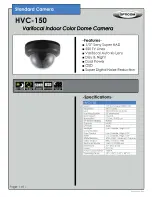
97
[YYYYMMDD Directory/HHMM
SS
ms]
First, create a subdirectory named “{year}{month}{day}” , then upload the video using the file name
“{hour}{minute}{second}{ms}.jpg”.
(Example: 20220601/112Z122000.jpg)
[Loop]
Video is uploaded with a file name numbered in sequence from 0000 up to the value set in [Maximum Number of Loops].
(Example: 0000.jpg, 0001.jpg) The number will return to 0000 when the maximum number of loops is reached.
Since the way FTP servers manage the upload of files with existing file names differs as follows, be sure to check the FTP
server specifications before configuring this setting.
• Overwrite the existing file name
• Automatically save the file with a different name
• Generate an error
[Maximum Number of Loops]
If [File Naming] is set to [Loop], enter the maximum number of loops.
[User
S
ettings]
Upload the video with the file name specified in [Subdirectory Name to Create] and [File Name to Create].
[
S
ubdirectory Name to Create], [File Name to Create]
If [File Naming] is set to [User Settings], enter the subdirectory name to be created as well as the file name to create.
For entering, parameter description can be used with the "%" character (P. 161).
[Upload Test]
Clicking [Exec] initiates an upload test based on the set value already entered.
Only a single JPEG image will be uploaded, but it is not necessary to apply the set value at that time. After entering a
password, first click [Exec], then click [Apply].
HTTP Upload
Settings for the HTTP upload function when [Upload] is set to [HTTP Upload].
HTTP upload is the function to send notifications via HTTP or images via HTTP according to the network camera events.
For information about the HTTP upload function and settings, contact a Canon’s sales representative.
[Notification]
Select whether to send event information notifications only or notifications with attached videos when using HTTP upload.
[
SS
L Connection]
Select whether to enable SSL connection.
[Verify
S
erver Certificate]
When [SSL Connection] is [Enable], set whether to verify the server certificate.
Note
• To verify a server certificate, it is necessary to import the CA certificate required for verification in [Security] > [Certificate Management]
> [CA Certificate Management] in advance.
[URI]
Enter the HTTP server URI to upload to.
[User Name], [Password]
Enter the user name and password required for authentication.
[Proxy
S
erver]
When using a proxy server, enter the host name or IP address of the proxy server.
[Proxy Port]
When using a proxy server, enter the port number of the proxy server.
[Proxy User Name], [Proxy Password]
Enter to use a user name and password for the proxy server.
[Parameter (query string)]
Enter the request parameters.
Parameters can be described using the “%” character (P. 161).
Summary of Contents for VB-H47
Page 194: ...194 Z Zoom 36 38 ...
















































